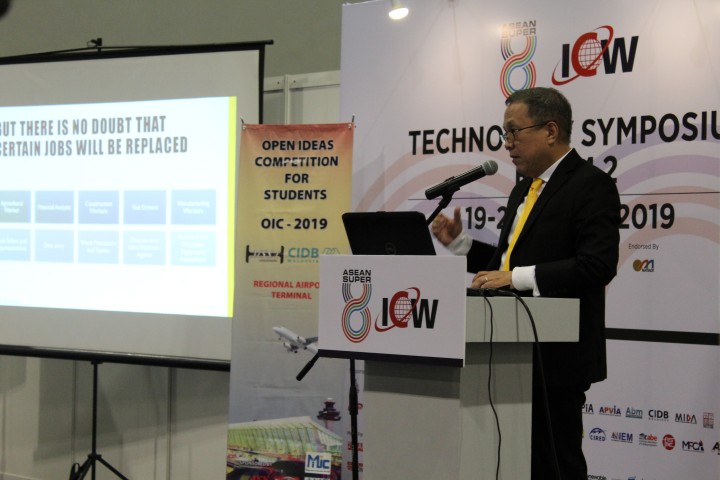Digitalisation And The Next Generation By Prof. Ir. Dr. Mohd Shahir Liew

Realising the need for Malaysia to grasp the understanding of what it truly means to be ready for the new era, Assoc. Prof. Ir. Dr. Mohd. Shahir Liew from Universiti Teknologi PETRONAS (UTP) has once again spoken to the greedy young minds of undergraduate students from the architecture and civil engineering backgrounds preparing to embark their journey into the real world. Prof. Shahir’s talk aptly titled Digitalisation and the Next Generation aimed to resolve the disparity between the older and the younger generations in order to embrace the evolvement of technology.
Prof. Shahir began his talk by breaking down the different stages in which technology has evolved throughout the years. From using animals as a means of transportation in the first Industrial Revolution (“IR”), discovering the convenience of steam engine machinations and electricity in the second IR, to developing and programming computers during the third IR, there can be no doubt that we have come a long way to undergo what is essentially the fourth stage of the IR in which space and time saving play major roles in our mission to be more efficient.
Delving further into the new era of IR 4.0, Prof. Shahir highlighted certain aspects of the evolving technology, the first of which is machine learning whereby technology companies like Google track their users’ web history in order to provide more contents that specifically cater to the habits of their individual users. This machine learning technology can be especially useful for companies to market their products and services somewhat directly to their targeted audience. Another aspect that was highlighted was the fact that the IR 4.0 has given birth to what is coined the Internet of Things (“IoT”), whereby anything can be digitilised and monitored from behind a screen, as well as the practice of cloud computing, whereby information and massive data can be digitally stored online without compensating on space and time consumption. Apart from that, the fine line between what is acceptable and what is considered inappropriate in terms of analysing the data obtained has always been an issue, and that is where the Data Protection Act comes in. Having said that, it is undeniable that machine learning, the IoT, and cloud computing have been key game-changers in many industries in recent times due to their efficiency and accuracy.
Other case study examples of the success of digitalisation in the current IR include the introduction of digital medical transfer by Siemens which enhanced the existing system in the medical industry to be more efficient, and thus, increasing the rate of medical successes. Apart from that, Prof. Shahir has asserted that the Petronas F1 team have also benefitted from the current IR digitalisation technology in which they utilised every minute detail of data, securing them their winnings at every race. Another success story of this era is the invention of autonomous vehicles, which seemed a bit too far-fetched just a few decades ago. The problem with this exciting new invention is that no one will know of who is to be blamed should road accidents occur.
However, unjustifiable legal matter such as the one mentioned above is not the only issue that is brought about as a result of digitalisation. The accuracy and efficiency of these new technologies have brought about a sense of worry amongst people whose careers are competing against them. Similar to companies like Petronas, despite being able to generate huge amounts counterfeit Rolex of data by the seconds to their advantage, these new technologies have caused thousands of human workers to be eliminated in their jobs.
In fact, this issue of workers being let go off after losing the competition to digital technology is unfortunately already happening globally, which begs us the question: Will we be jobless in the future? Well, Prof. Shahir has a very optimistic outlook in this matter. While it is true that wisdom comes with age, Prof. Shahir is a firm advocator of the younger and older generations working hand-in-hand parallel to the evolvement of technology in order to achieve sustainable careers. He believes that an open-mind and a ready heart to embrace lifestyle changes induced by the fast-paced technology are the keys to find other career opportunities despite the fact that many jobs will be affected. Drawing on the idea of the Blue Ocean Strategy introduced by W. Chan Kim and Renee Mauborgne, Prof. Shahir believes that there are many opportunities to be grabbed in the yet-to-be discovered uncontested market space.
The question is: Are we ready?



